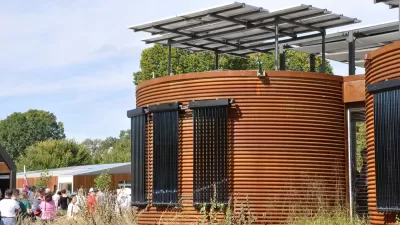As President Trump rolls back climate and energy regulations, many states are attempting to require utilities to get more power from renewable sources. Also, fewer states are attempting to reduce or eliminate renewable energy requirements.

"Today, 29 states require utilities to secure a certain percentage of their electricity from sources like wind and solar," reports Benjamin Storrow for E&E News. "In all, 10 states are considering an increase in renewable portfolio standards (RPS), according to the National Conference of State Legislatures (NCSL)," including:
- Massachusetts and California lawmakers are contemplating proposals to go 100 percent renewable (Climatewire, March 13).
- Legislators in Nevada and New Jersey have laid out plans to get 80 percent of their power from low-carbon sources.
- Efforts in Connecticut and Minnesota, where policymakers are debating boosting renewable energy mandates to 50 percent, are relatively modest by comparison.
Click on the map on the NCSL webpage to see the standards for states and U.S. territories.
However, the RPS, while effective at reducing greenhouse gas emissions, is not the best tool, according to Jay Apt, co-director of the Electricity Industry Center at Carnegie Mellon University. But from a political perspective, meaning one of most effective tools that stand a chance of being passed into law, they do well, he adds.
Many economists would prefer a carbon tax or cap-and-trade regimen to a mandate. A carbon price is more flexible and less costly, they reason. Instead of requiring power companies to adopt technologies like wind and solar, a cap or tax leaves it to the market to identify the least-costly compliance options.
No state has passed a carbon tax. Washington voters rejected a type of carbon tax last November. California is the only state to operate a cap-and-trade program, though it's future is questionable unless new legislation passes. Oregon is considering a program as well.
On the other side of the RPS debate, "[f]our states are considering bills to lower their current standards," writes Storrow. "Ohio and New Hampshire are considering full repeals. Concerns over costs are driving those debates."
In addition, "Americans for Prosperity, a conservative advocacy group funded by the Koch brothers, has been instrumental in many of the efforts to reduce or repeal state RPS mandates," adds Starrow. The group is also promoting a bill to repeal tax credits for electric vehicles in Colorado, reports Hiroko Tabuchi, business reporter for The New York Times.
FULL STORY: More states consider boosting renewable fuel mandates

Alabama: Trump Terminates Settlements for Black Communities Harmed By Raw Sewage
Trump deemed the landmark civil rights agreement “illegal DEI and environmental justice policy.”

Study: Maui’s Plan to Convert Vacation Rentals to Long-Term Housing Could Cause Nearly $1 Billion Economic Loss
The plan would reduce visitor accommodation by 25% resulting in 1,900 jobs lost.

Planetizen Federal Action Tracker
A weekly monitor of how Trump’s orders and actions are impacting planners and planning in America.

Waymo Gets Permission to Map SF’s Market Street
If allowed to operate on the traffic-restricted street, Waymo’s autonomous taxis would have a leg up over ride-hailing competitors — and counter the city’s efforts to grow bike and pedestrian on the thoroughfare.

Parklet Symposium Highlights the Success of Shared Spaces
Parklets got a boost during the Covid-19 pandemic, when the concept was translated to outdoor dining programs that offered restaurants a lifeline during the shutdown.

Federal Homelessness Agency Places Entire Staff on Leave
The U.S. Interagency Council on Homelessness is the only federal agency dedicated to preventing and ending homelessness.
Urban Design for Planners 1: Software Tools
This six-course series explores essential urban design concepts using open source software and equips planners with the tools they need to participate fully in the urban design process.
Planning for Universal Design
Learn the tools for implementing Universal Design in planning regulations.
Caltrans
Smith Gee Studio
Institute for Housing and Urban Development Studies (IHS)
City of Grandview
Harvard GSD Executive Education
Toledo-Lucas County Plan Commissions
Salt Lake City
NYU Wagner Graduate School of Public Service





























